Experiments
So Weird It Hurts?

Cartoon expletives aside, a bit of invective can do you the world of good, or so said scientists recently. A research team from from Keele University asked volunteers to hold their hand in freezing water for as long as they could manage while repeating either an innocuous word or the swear-word of their choice. The swearers held out for an average of two minutes, while non-swearers managed only 1 minute 15 seconds. But while Rohan Byrt of the Casual Swearing Appreciation Society claimed the study demonstrated the benefits of swearing, team leader Richard Stephens warned that everyday swearing would lessen its painkilling effects. "Swearing is emotional language" he explained, "but if you overuse it, it loses its emotional attachment" (BBC News).
From this week, pregnant women throughout Britain considering "letting it out" to help with the pain might also want to direct their curses towards Dr Denis Walsh, associate professor of midwifery at Nottingham University in England. In an article in the journal Evidence Based Midwifery, Dr Walsh claimed last week that the pain of childbirth was useful and a "timeless rite of passage", and women should not be trying to avoid it with epidural anaesthesia. Walsh based his statement on the fact that the use of epidurals has almost doubled in the past two decades, claiming that in 20% of cases, the procedure was unnecessary. While some, like Dr. Justin Clarke of the Birmingham Women's Hospital, rejected Walsh's data, saying it was wrong to characterise modern women as "less stoical", others supported him, such as Mary Newburn of the National Childbirth Trust who spoke of there being an "epidural culture" (Telegraph).
But perhaps women might be convinced to trade in the needle for a fancy rubber suit? Baltimore company Under Armour has developed a hi-tech, full length bodysuit that is said to allow athletes recover more quickly after strenuous activity. Under Armour's "Recharge" range gently squeezes the athlete's body forcing excess fluid out of the muscles and back into the bloodstream over a period of hours after a workout, reversing the "pumped" effect of the exercise. Research by the University of Connecticut showed that doing so resulted in subjects feeling less soreness and swelling of the muscles and recuperating faster (Journal Gazette).
More in extended >>
Posted By: Dumbfounded - Tue Jul 14, 2009 -
Comments (3)
Category: Exercise and Fitness, Frauds, Cons and Scams, Health, Injuries, Medicine, Obscenity, Science, Experiments, Stupid Criminals, Weddings
Painful paintball in slow motion
This video makes me wince, but I feel better when I remember the guy only gets shot once, but it is reshown in six times -- sometimes in slow motion, and from different angles.I especially like the slow motion rippling effect. More slow motion later in the week!!
Posted By: gdanea - Tue Jul 14, 2009 -
Comments (4)
Category: Experiments
It Just Ain’t Natural!
Here's a quick round-up of a few things that I couldn't quite crow-bar into the "Weird Wildlife" category.If you've any particular aversion to rats, and quite a lot of people have, then Deshnok in India is probably a place best avoided, for there stands the Karni Mata Temple, built a century ago and devoted to the Hindu matriarch Karni Mata. Worshipped as a 14th century incarnation of the goddess Durga, Karni Mata is said to have struck a deal with Yama, the god of death, that all members of her clan would reincarnate as rats so that the clan would remain united. Hence rats in Deshnok are sacred animals, venerated as ancestors, and fed and protected by the locals, so than now thousands of rats scamper over the feet of visitors to the temple (National Geographic).
And it's not only in India that people have built havens for rats, one was once built in British Columbia, though for quite a different reason. Bruce Alexander was studying addiction, and he had a problem. He knew that rats kept in cramped cages or strapped to apparatus that allowed them to dose themselves with drugs, would often do so to the point of self-destruction, but, he thought, could you really blame them? What if the addiction to the drugs was a product of their environment, rather than a reaction to the drug itself? Hence, in the 1970s, Alexander decided to give his rats the best living conditions he could, so he build "Rat Park". It was 95 square-feet in area, and well stocked with food, toys and "private areas" where the rats - who would be of both sexes - could go to mate or give birth. It was then filled with rats who had been forced to consume morphine for 8 weeks prior to the experiment, quite long enough to cause hopeless addiction in standard experiments, who were now offered a choice of pure water, or more morphine. All of them chose water. Nothing Alexander could do would entice them to take the drug, even sweetening it had no effect, only when he added naloxone (a drug that blocks the action of opiates) or diluted the morphine to the point of near impotency, could park rats be tempted to take it (Absolute Astronomy).
Yet another piece of rodent research now, as scientists (sadly not from NIMH) have found that transplanting a human 'language gene' into mice affects the way they communicate with one another. The gene, called foxp2 is one of a small family of genes known to be markedly different in humans compared to apes and other animals, hence may be the genes that are the very core of our humanity, so would putting a humanized gene in a mouse create a talking mouse? Well, no, there's a lot more to our use of language than a single gene, however while the transgenic mice were significantly less curious, they also showed increased growth and plasticity in the speech centres of their brains, and a tendency to use a greater range of frequencies in their calls (NY Times).
More in extended >>
Posted By: Dumbfounded - Sun Jun 07, 2009 -
Comments (1)
Category: Animals, Languages, Nature, Experiments
Eyeborg
Rob Spence, a filmmaker in Canada, who lost his right eye has now replaced that eye with a camera. Engineer Kosta Grammatis designed a video camera and transmitter that would fit into a prosthetic eye. Just think of all the possibilities. Waring: video does contain a very brief scene of eye surgery in the beginning. EyeborgEyeborg Phase II from eyeborg on Vimeo.
Posted By: mdb777 - Tue Jun 02, 2009 -
Comments (1)
Category: Body Modifications, Robots, Video, Experiments
Underwater Mouse
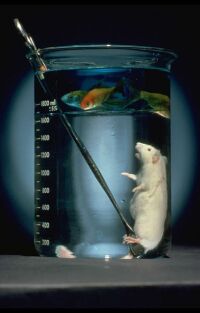
Posted By: Paul - Wed Apr 22, 2009 -
Comments (6)
Category: Animals, Science, Experiments
Artificial Blitzkriegs
I came across a description of this experiment in an old newspaper (Reno Evening Gazette, Sep 8, 1941) and have never found any other references to it. The experiment was conducted by British psychologists who wanted to find out if "civilian populations can be made immune, through familiarity, to fear caused by air raid noises." The methodological problems with the design of the experiment are obvious, but it's interesting that it was conducted nevertheless. The details follow:Sound effects used in the test were recordings made during one of London's worst air raids last year, amplified to simulate the real thing. An Associated Press writer who witnessed the experiment reported:
"The sounds swelled in the dark vault. The guns kept banging. Then big bombs burst. The guns kept up. More bombs. Then the crackle of flames. Next clanging fire engines added their noise, the other sounds continuing."
According to the reporter, the subjects stood the test very well: 'No one was crying out. A flashlight swung around the room, revealing drawn faces and frightened eyes. But no one was swooning. The experimenters stepped up the amplification.'
The British psychologists responsible for the experiment were reported delighted with the results. They said it proved their theory that whole populations could be exposed to 'artificial blitzkriegs' and thus rendered immune to fear during air raids.
Posted By: Alex - Thu Apr 09, 2009 -
Comments (5)
Category: Science, Experiments, Psychology, War
Why Tinfoil Hats Don’t Work
You might have seen the newspaper reports last fall about this experiment. Here's how it was done.
Posted By: Paul - Fri Mar 27, 2009 -
Comments (4)
Category: Eccentrics, Science, Experiments, Psychology, Technology
Bertillon Measurements
You've probably heard of the Bertillon System, one of those discredited "scientific" theories detailing how body measurements indicated racial and/or criminal aspects of a person.Well, here's how the NYC Police Department went about securing Bertillon measurements, circa 1908--courtesy of the George Bain Collection at the Library of Congress.
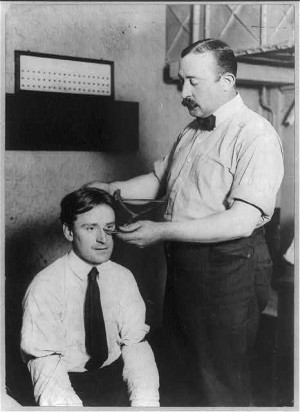
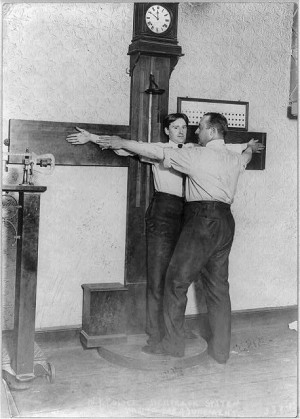
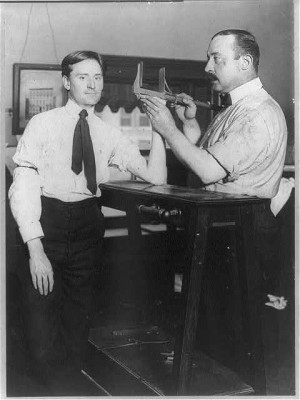
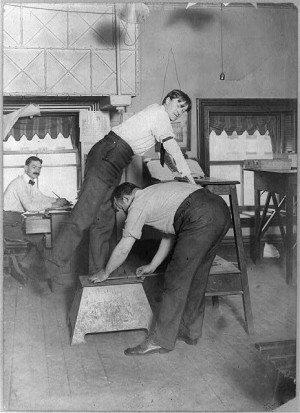
Posted By: Paul - Fri Feb 06, 2009 -
Comments (6)
Category: Crime, Fads, Science, Anthropology, Experiments, Stereotypes and Cliches, 1900s
Decomposition of a Pig
A time-lapse movie of a decomposing pig, taken by Dr. Jerry Payne in the 1960s as part of his graduate studies. It's four days compressed into six minutes. Not much happens at first, but around the 3 minute mark things get pretty interesting. There's a nasty little surprise at the end as well. (Note: the pig died of natural causes.)The purple dots that appear around 2:40 are beads to show the movement of soil by insects.
You may not want to watch this while you're eating a meal.
Posted By: Alex - Thu Jan 08, 2009 -
Comments (13)
Category: Death, Science, Experiments
Cat-Rat Cooperation Disproves Darwin
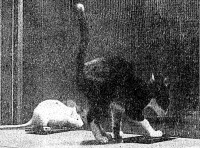 Chuck's post last week about the guy who trained a rat to sit on top of a cat sitting on a dog, reminded me of the groundbreaking research of Dr. Loh Seng Tsai, conducted back in the late 1940s/early 1950s.
Chuck's post last week about the guy who trained a rat to sit on top of a cat sitting on a dog, reminded me of the groundbreaking research of Dr. Loh Seng Tsai, conducted back in the late 1940s/early 1950s.Dr. Tsai trained a cat and a rat to cooperate together in order to get food. From the LA Times, July 15, 1951:
To get into the third section, where a dish of food awaits, the cat and mouse must each step on a floor button simultaneously. When this is done by perfect cooperation the gate drops and both animals thus gain admittance to the food chamber.
Dr. Tsai reported that, "Soon all the pairs of cats and rats began to work together. Finally their cooperation was so perfect that they took only three seconds to reach their food from the entrance."
Dr. Tsai figured that these results disproved Darwin's concept of the Survival of the Fittest. He told the LA Times reporter: "In the face of the fact that even alley cats and rats live together, eat together, sleep together, play together and work together, Darwin's theory seems at most only a half-truth."
What's really amazing is that this guy was a professor of biology at first the University of Chicago, then Tulane, then UCLA, and yet he didn't seem to have a clear understanding of what Darwin meant by the Survival of the Fittest. Nor, as far as I can tell, did anyone ever call him out as a crackpot. In fact, there was talk of nominating him for the Nobel Peace Prize.
Posted By: Alex - Tue Dec 23, 2008 -
Comments (6)
Category: Animals, Science, Experiments

| Who We Are |
|---|
| Alex Boese Alex is the creator and curator of the Museum of Hoaxes. He's also the author of various weird, non-fiction, science-themed books such as Elephants on Acid and Psychedelic Apes. Paul Di Filippo Paul has been paid to put weird ideas into fictional form for over thirty years, in his career as a noted science fiction writer. He has recently begun blogging on many curious topics with three fellow writers at The Inferior 4+1. Contact Us |




